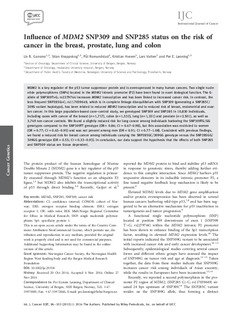| dc.contributor.author | Gansmo, Liv Beathe | |
| dc.contributor.author | Knappskog, Stian | |
| dc.contributor.author | Romundstad, Pål Richard | |
| dc.contributor.author | Hveem, Kristian | |
| dc.contributor.author | Vatten, Lars Johan | |
| dc.contributor.author | Lønning, Per Eystein | |
| dc.date.accessioned | 2015-06-29T13:15:47Z | |
| dc.date.accessioned | 2016-06-02T10:41:42Z | |
| dc.date.available | 2015-06-29T13:15:47Z | |
| dc.date.available | 2016-06-02T10:41:42Z | |
| dc.date.issued | 2015 | |
| dc.identifier.citation | International Journal of Cancer 2015, 137(1):96-103 | nb_NO |
| dc.identifier.issn | 1097-0215 | |
| dc.identifier.uri | http://hdl.handle.net/11250/2391185 | |
| dc.description.abstract | MDM2 is a key regulator of the p53 tumor suppressor protein and is overexpressed in many human cancers. Two single nucleotide polymorphisms (SNPs) located in the MDM2 intronic promoter (P2) have been found to exert biological function. The G-allele of SNP309T>G; rs2279744 increases MDM2 transcription and has been linked to increased cancer risk. In contrast, the less frequent SNP285G>C; rs117039649, which is in complete linkage disequilibrium with SNP309 (generating a SNP285C/309G variant haplotype), has been related to reduced MDM2 transcription and to reduced risk of breast, endometrial and ovarian cancer. In this large population-based case–control study, we genotyped SNP309 and SNP285 in 10,830 individuals, including cases with cancer of the breast (n=1,717), colon (n=1,532), lung (n=1,331) and prostate (n=2,501), as well as 3,749 non-cancer controls. We found a slightly reduced risk for lung cancer among individuals harboring the SNP309TG/GG genotypes compared to the SNP309TT genotype (OR= 0.86; CI = 0.67–0.98), but this association was restricted to women (OR = 0.77; CI = 0.63–0.95) and was not present among men (OR = 0.91; CI = 0.77–1.08). Consistent with previous findings, we found a reduced risk for breast cancer among individuals carrying the SNP285GC/309GG genotype versus the SNP285GG/309GG genotype (OR = 0.55; CI = 0.33–0.93). In conclusion, our data support the hypothesis that the effects of both SNP285 and SNP309 status are tissue dependent. | nb_NO |
| dc.language.iso | eng | nb_NO |
| dc.publisher | Wiley | nb_NO |
| dc.relation.uri | http://onlinelibrary.wiley.com/doi/10.1002/ijc.29358/pdf | |
| dc.rights | Navngivelse-Ikkekommersiell 3.0 Norge | * |
| dc.rights.uri | http://creativecommons.org/licenses/by-nc/3.0/no/ | * |
| dc.title | Influence of MDM2 SNP309 and SNP285 status on the risk of cancer in the breast, prostate, lung and colon | nb_NO |
| dc.type | Journal article | nb_NO |
| dc.type | Peer reviewed | nb_NO |
| dc.date.updated | 2015-06-29T13:15:47Z | |
| dc.subject.nsi | VDP::Medisinske fag: 700::Klinisk medisinske fag: 750::Onkologi: 762 | nb_NO |
| dc.subject.nsi | VDP::Midical sciences: 700::Clinical medical sciences: 750::Oncology: 762 | nb_NO |
| dc.source.pagenumber | 96-103 | nb_NO |
| dc.source.volume | 137 | nb_NO |
| dc.source.journal | International Journal of Cancer | nb_NO |
| dc.source.issue | 1 | nb_NO |
| dc.identifier.doi | 10.1002/ijc.29358 | |
| dc.identifier.cristin | 1203426 | |
| dc.description.localcode | © 2014 The Authors. Published by Wiley Periodicals, Inc. on behalf of UICC. This is an open access article under the terms of the Creative Commons Attribution-NonCommercial License, which permits use, distribution and reproduction in any medium, provided the original work is properly cited and is not used for commercial purposes | nb_NO |

